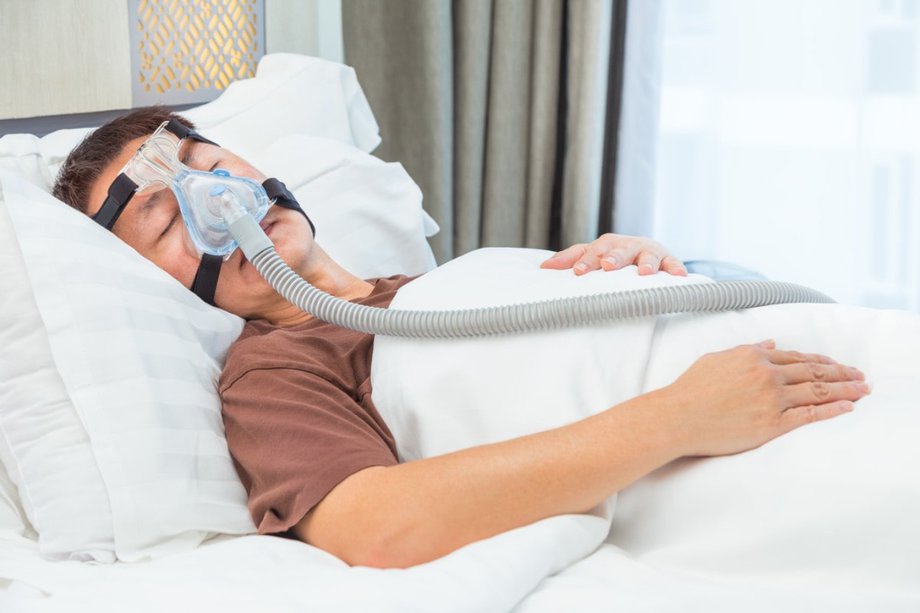Why Should You Avoid Ignoring Sleep Apnea Symptoms?

Sleep apnea is a common sleep disorder characterized by interrupted breathing during sleep. It is important to recognize and address the symptoms of sleep apnea, as ignoring them can lead to serious health consequences.
This article aims to provide an objective overview of why individuals should avoid ignoring sleep apnea symptoms.
The article will begin by explaining what sleep apnea is and the potential health risks associated with untreated sleep apnea. It will emphasize the importance of seeking a proper diagnosis for sleep apnea and highlight the available treatment options.
The article will also discuss the benefits of treating sleep apnea, such as improved sleep quality and overall health. Additionally, it will address the impact of sleep apnea on relationships and provide tips for managing symptoms at home.
By seeking professional help for sleep apnea and addressing the symptoms in a timely manner, individuals can avoid potential health complications and improve their overall well-being. It is crucial to understand the significance of addressing sleep apnea symptoms and taking necessary steps for diagnosis and treatment.
Key Takeaways
- Ignoring sleep apnea symptoms can lead to serious health consequences such as high blood pressure, heart disease, stroke, diabetes, and depression.
- Sleep apnea can impair cognitive function and lead to daytime sleepiness and decreased productivity.
- Seeking a proper diagnosis for sleep apnea is important for early intervention, identifying underlying health issues, and improving sleep quality.
- Treatment for sleep apnea, such as CPAP therapy, oral appliances, and lifestyle changes, can improve overall sleep quality, cognitive function, and quality of life, as well as reduce the risk of developing chronic conditions like high blood pressure, heart disease, and diabetes.
Understanding Sleep Apnea
Sleep apnea is a potentially serious sleep disorder characterized by pauses in breathing or shallow breaths during sleep. These pauses, known as apneas, can last for a few seconds to minutes and can occur multiple times throughout the night.
There are three main types of sleep apnea: obstructive sleep apnea, central sleep apnea, and complex sleep apnea syndrome. Obstructive sleep apnea is the most common type and is caused by a blockage of the airway, usually when the soft tissue in the back of the throat collapses during sleep.
Central sleep apnea occurs when the brain fails to signal the muscles to breathe. Complex sleep apnea syndrome is a combination of both obstructive and central sleep apnea.
If left untreated, sleep apnea can lead to various health complications, including high blood pressure, heart disease, stroke, diabetes, and depression. It can also result in daytime sleepiness, fatigue, and decreased quality of life. Therefore, it is crucial to recognize and address sleep apnea symptoms to prevent these potential risks.
Health Risks of Untreated Sleep Apnea
Untreated sleep apnea can lead to a range of health risks that can have a significant impact on one’s overall well-being.
One of the primary risks associated with untreated sleep apnea is hypertension. The repetitive episodes of interrupted breathing during sleep can result in elevated blood pressure, which in turn increases the likelihood of developing cardiovascular diseases such as heart attacks and strokes.
Additionally, untreated sleep apnea has been linked to an increased risk of developing type 2 diabetes. The disrupted sleep patterns and oxygen deprivation associated with sleep apnea can disrupt glucose metabolism and insulin sensitivity, contributing to the development of diabetes.
Furthermore, untreated sleep apnea can also impair cognitive function and lead to daytime sleepiness, increasing the risk of accidents and decreased productivity.
It is essential to address and treat sleep apnea symptoms promptly to mitigate these potential health risks.
Importance of Seeking Diagnosis
Seeking a proper diagnosis for sleep apnea is crucial for understanding and addressing the potential health risks associated with this condition. Ignoring the symptoms of sleep apnea can have serious consequences on an individual’s overall health and well-being. Here are three reasons why seeking a diagnosis is important:
- Early intervention: By seeking a diagnosis, individuals can start treatment early, which can help prevent further complications and improve their quality of life.
- Identification of underlying health issues: Sleep apnea is often linked to other health conditions such as obesity, high blood pressure, and heart disease. A diagnosis can help identify these underlying issues and allow for appropriate treatment.
- Improved sleep quality: With a proper diagnosis, individuals can receive tailored treatment options that can help improve their sleep quality and reduce the negative impact of sleep apnea on their daily life.
Seeking a diagnosis for sleep apnea is crucial for addressing potential health risks, identifying underlying health issues, and improving sleep quality.
Treatment Options for Sleep Apnea
This paragraph will discuss the treatment options available for sleep apnea.
These options include Continuous Positive Airway Pressure (CPAP) Therapy, which involves wearing a mask that delivers a constant flow of air to keep the airway open during sleep.
Another option is the use of oral appliances, which help to reposition the jaw and tongue to prevent the airway from becoming blocked.
Additionally, lifestyle changes such as maintaining a healthy weight and avoiding alcohol and sedatives can also be effective in managing sleep apnea.
Continuous Positive Airway Pressure (CPAP) Therapy
CPAP therapy, a commonly recommended treatment for sleep apnea, has been shown to effectively alleviate symptoms and improve overall sleep quality.
It involves wearing a mask over the nose or mouth during sleep, which is connected to a machine that delivers a continuous stream of pressurized air.
This increased air pressure helps to keep the airways open, preventing episodes of apnea and reducing the frequency and severity of snoring.
CPAP therapy has been found to significantly reduce daytime sleepiness, improve cognitive function, and enhance quality of life for individuals with sleep apnea.
It is important to note that adherence to CPAP therapy can be challenging, as some individuals may experience discomfort or difficulty adjusting to the mask and machine.
However, with proper education, support, and regular follow-up, CPAP therapy can be an effective long-term treatment for sleep apnea.
Oral Appliances
Moving on from the previous subtopic of Continuous Positive Airway Pressure (CPAP) Therapy, another effective treatment option for sleep apnea is the use of oral appliances. These devices are designed to reposition the jaw and tongue, thereby keeping the airway open during sleep.
Oral appliances are typically recommended for individuals with mild to moderate sleep apnea or for those who are unable to tolerate CPAP therapy. They work by advancing the lower jaw, which helps to prevent the collapse of the airway and reduce snoring.
Oral appliances are custom-made by dental professionals and are generally well-tolerated by patients. However, it is important to note that the effectiveness of these devices may vary depending on the individual’s specific anatomy and severity of sleep apnea. Regular follow-up with a healthcare provider is essential to ensure the proper fit and effectiveness of the oral appliance.
Lifestyle Changes and Weight Management
Additionally, implementing lifestyle changes and managing weight can play a significant role in improving the symptoms of sleep apnea. Making certain adjustments to one’s lifestyle can help alleviate the severity of sleep apnea and enhance overall sleep quality.
Here are three lifestyle changes that can be beneficial:
- Regular exercise: Engaging in physical activities can aid in weight loss, which in turn can reduce the severity of sleep apnea symptoms. Exercise helps strengthen the respiratory muscles, promoting better airflow during sleep.
- Healthy diet: Adopting a balanced and nutritious diet can contribute to weight management. Avoiding excessive consumption of high-calorie and fatty foods can help control weight gain, which is often associated with sleep apnea.
- Avoiding alcohol and smoking: Alcohol and smoking can worsen sleep apnea symptoms. These substances relax the airway muscles and cause inflammation, leading to breathing difficulties during sleep.
By incorporating these lifestyle changes, individuals can potentially experience an improvement in their sleep apnea symptoms and overall well-being.
Benefits of Treating Sleep Apnea
One significant advantage of addressing sleep apnea symptoms is the potential improvement in overall quality of life for individuals. By treating sleep apnea, individuals can experience a range of benefits that positively impact their physical, mental, and emotional well-being.
Firstly, treating sleep apnea can lead to increased daytime alertness and energy levels, as individuals are able to obtain restful and uninterrupted sleep. This can result in improved cognitive functioning, memory, and concentration.
Additionally, treating sleep apnea can reduce the risk of developing chronic conditions such as high blood pressure, heart disease, and diabetes.
Furthermore, individuals who receive treatment may also experience a decrease in symptoms such as morning headaches, excessive daytime sleepiness, and mood disturbances.
Overall, addressing sleep apnea symptoms can greatly enhance an individual’s overall quality of life and well-being.
Impact of Sleep Apnea on Relationships
The presence of sleep apnea can have a significant impact on the dynamics and quality of relationships. Sleep apnea, a common sleep disorder, can cause disruptions in sleep patterns and lead to a variety of symptoms such as loud snoring, daytime fatigue, and irritability. These symptoms can cause strain and tension in relationships, as they can affect both the sleep quality of the person with sleep apnea and their partner.
The impact of sleep apnea on relationships can include:
- Lack of quality sleep for both partners
- Increased irritability and mood swings
- Reduced intimacy and sexual satisfaction
- Communication problems due to fatigue and daytime sleepiness
Addressing sleep apnea through proper diagnosis and treatment can help alleviate these relationship challenges and improve overall quality of life for both individuals. Seeking medical attention and exploring treatment options is crucial to avoid the negative impact that sleep apnea can have on relationships.
Tips for Managing Sleep Apnea Symptoms at Home
Managing sleep apnea symptoms at home can be achieved through various strategies and lifestyle modifications. It is important to address these symptoms to improve overall well-being and reduce the risk of complications. Here are some tips for managing sleep apnea symptoms at home:
- Maintain a consistent sleep schedule: Going to bed and waking up at the same time every day can help regulate your sleep pattern and improve the quality of your sleep.
- Create a sleep-friendly environment: Ensure that your bedroom is quiet, dark, and cool. Use comfortable bedding and pillows that support the natural alignment of your spine.
- Practice good sleep hygiene: Avoid caffeine and large meals close to bedtime. Establish a relaxing bedtime routine, such as reading or taking a warm bath, to signal your body that it’s time to sleep.
Remember to consult with a healthcare professional for a proper diagnosis and personalized treatment plan.
| Strategies for Managing Sleep Apnea Symptoms | |||
|---|---|---|---|
| Maintain a consistent sleep schedule | Create a sleep-friendly environment | Practice good sleep hygiene | |
| Lose weight if overweight | Sleep on your side | Elevate your head while sleeping | |
| Avoid alcohol and sedatives | Use nasal strips or a nasal dilator | Practice relaxation techniques | …such as deep breathing or meditation before bed. |
Seek Professional Help for Sleep Apnea
Consulting a sleep specialist is crucial for anyone experiencing sleep apnea symptoms. These professionals have the expertise to diagnose and recommend appropriate treatments for the condition.
Additionally, follow-up care is essential to monitor the effectiveness of the treatment plan and make any necessary adjustments.
Support groups and resources can also provide valuable information and emotional support for individuals dealing with sleep apnea.
Consulting a Sleep Specialist
Seeking the expertise of a sleep specialist allows individuals to gain a comprehensive understanding of their sleep apnea symptoms and receive tailored treatment recommendations. Sleep specialists are medical professionals who have specialized knowledge and experience in diagnosing and treating sleep disorders, including sleep apnea.
Consulting a sleep specialist offers several benefits:
- Accurate diagnosis: Sleep specialists can conduct various tests, such as a sleep study, to accurately diagnose sleep apnea and determine its severity.
- Personalized treatment plan: A sleep specialist can develop a personalized treatment plan based on the individual’s specific needs and preferences.
- Continuous monitoring: Sleep specialists can provide ongoing monitoring and adjustments to treatment plans to ensure optimal effectiveness and address any changes in symptoms.
- Access to advanced therapies: Sleep specialists stay up-to-date with the latest advancements in sleep apnea treatment and can offer access to cutting-edge therapies and technologies.
By consulting a sleep specialist, individuals can receive the expert guidance and support needed to manage their sleep apnea and improve their overall sleep quality and health.
Importance of Follow-up Care
Continuity of care is crucial in ensuring the optimal management and treatment of sleep apnea, as regular follow-up appointments with a sleep specialist enable ongoing monitoring and adjustments to the treatment plan, allowing for the timely identification and resolution of any potential issues or changes in the patient’s condition. These follow-up appointments serve several important purposes. Firstly, they provide an opportunity for the sleep specialist to assess the effectiveness of the treatment and make any necessary modifications. Secondly, they allow for the evaluation of the patient’s adherence to the treatment regimen, which is essential for successful long-term management. Lastly, follow-up care facilitates the identification of any new symptoms or complications that may arise, ensuring prompt intervention and prevention of further health deterioration. By maintaining regular follow-up appointments, individuals with sleep apnea can receive the necessary support and adjustments to their treatment, ultimately improving their overall quality of life.
| Importance of Follow-up Care: | |
|---|---|
| Enables ongoing monitoring and adjustments | Regular appointments allow for the evaluation of treatment effectiveness and necessary modifications. |
| Evaluates patient’s adherence to treatment regimen | Follow-up care ensures the patient’s compliance with the treatment plan for long-term management. |
| Identifies new symptoms or complications | Regular check-ups facilitate early detection and intervention, preventing further health deterioration. |
| Supports timely intervention and resolution | Ongoing care allows for prompt action in addressing any potential issues or changes in the patient’s condition. |
| Improves overall quality of life | Continuity of care through follow-up appointments enhances the patient’s well-being and treatment outcomes. |
Support Groups and Resources
Support groups and resources are valuable tools for individuals with sleep apnea, as they provide a supportive community and access to helpful information, strategies, and coping mechanisms for managing their condition. These groups offer a platform for individuals to connect with others who are going through similar experiences, allowing them to share their stories, concerns, and successes.
By participating in support groups, individuals can gain valuable insights and advice from others who have successfully managed their sleep apnea. Additionally, resources such as educational materials, online forums, and websites provide a wealth of information about the condition, its symptoms, treatment options, and lifestyle changes that can improve sleep quality. These resources also offer guidance on effective strategies to cope with the challenges associated with sleep apnea, such as maintaining a healthy sleep routine, using continuous positive airway pressure (CPAP) devices correctly, and managing stress levels.
Overall, support groups and resources play a crucial role in empowering individuals with sleep apnea to take control of their condition and improve their quality of life.
Frequently Asked Questions
Can sleep apnea be cured completely?
Sleep apnea cannot be completely cured, but it can be effectively managed through various treatments such as continuous positive airway pressure (CPAP) therapy, lifestyle modifications, and surgical interventions to improve breathing and alleviate symptoms.
Are there any alternative treatment options for sleep apnea?
Alternative treatment options for sleep apnea include continuous positive airway pressure (CPAP) therapy, oral appliances, and surgery. These options aim to improve breathing during sleep and can provide relief from symptoms and improve quality of life.
How long does it take to see improvements after starting sleep apnea treatment?
The time it takes to see improvements after starting sleep apnea treatment varies depending on the individual and the specific treatment method used. However, most individuals experience noticeable improvements in their symptoms within a few weeks to a few months of starting treatment.
Can sleep apnea affect children?
Sleep apnea can affect children and should not be ignored. It can lead to various health problems, including cognitive and behavioral issues, growth impairment, and cardiovascular complications. Early diagnosis and treatment are crucial for managing these symptoms and improving the child’s overall health.
Are there any natural remedies or lifestyle changes that can help alleviate sleep apnea symptoms?
There are natural remedies and lifestyle changes that can help alleviate sleep apnea symptoms. For example, losing weight, avoiding alcohol and sedatives, sleeping on your side, and using nasal strips or oral devices may provide relief.











